人教新目标版英语七年级下Unit 4 Don't eat in class.Section A Grammar Focus-3c课件(25张ppt无素材)
文档属性
| 名称 | 人教新目标版英语七年级下Unit 4 Don't eat in class.Section A Grammar Focus-3c课件(25张ppt无素材) |
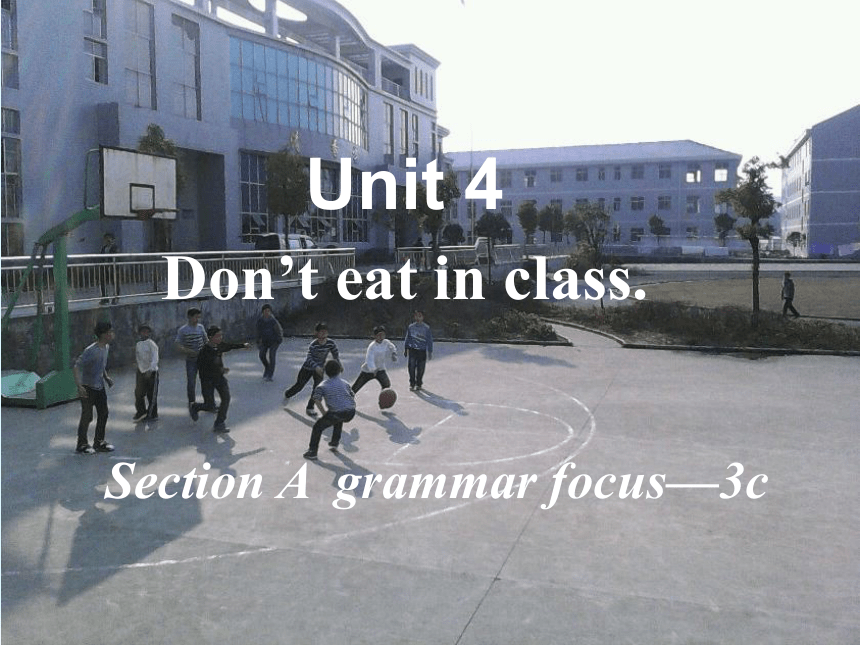
|
|
| 格式 | zip | ||
| 文件大小 | 2.5MB | ||
| 资源类型 | 教案 | ||
| 版本资源 | 人教新目标(Go for it)版 | ||
| 科目 | 英语 | ||
| 更新时间 | 2020-11-23 00:00:00 | ||
图片预览

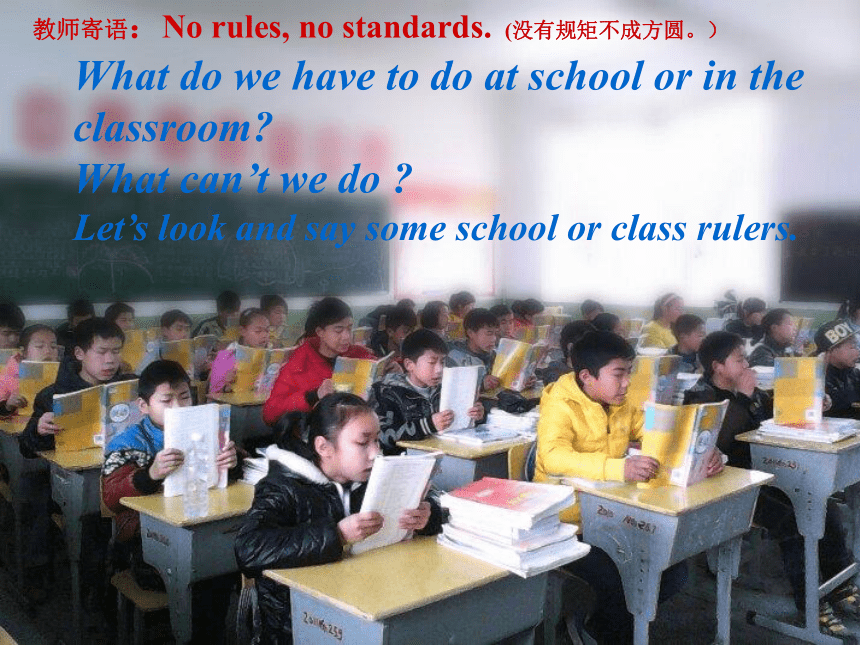

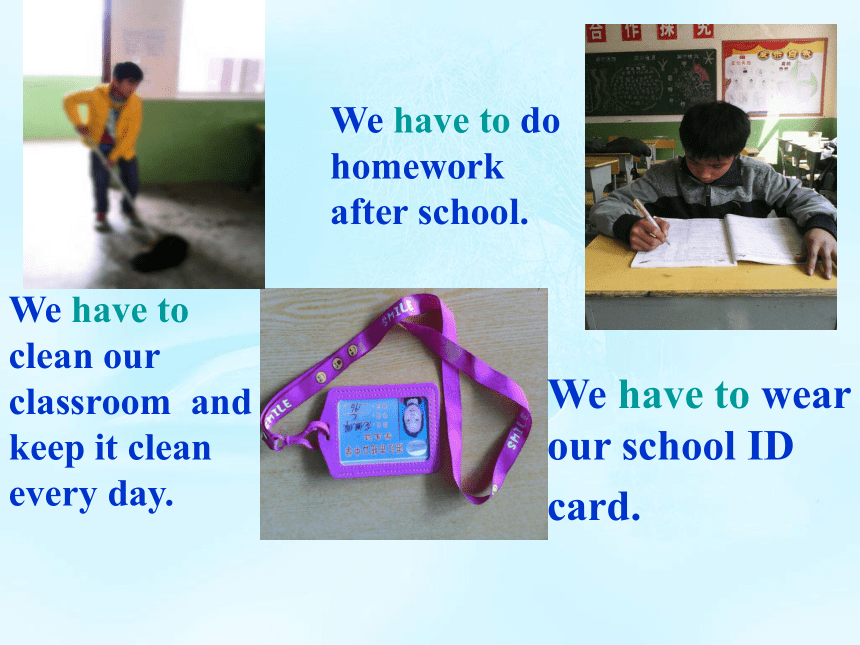
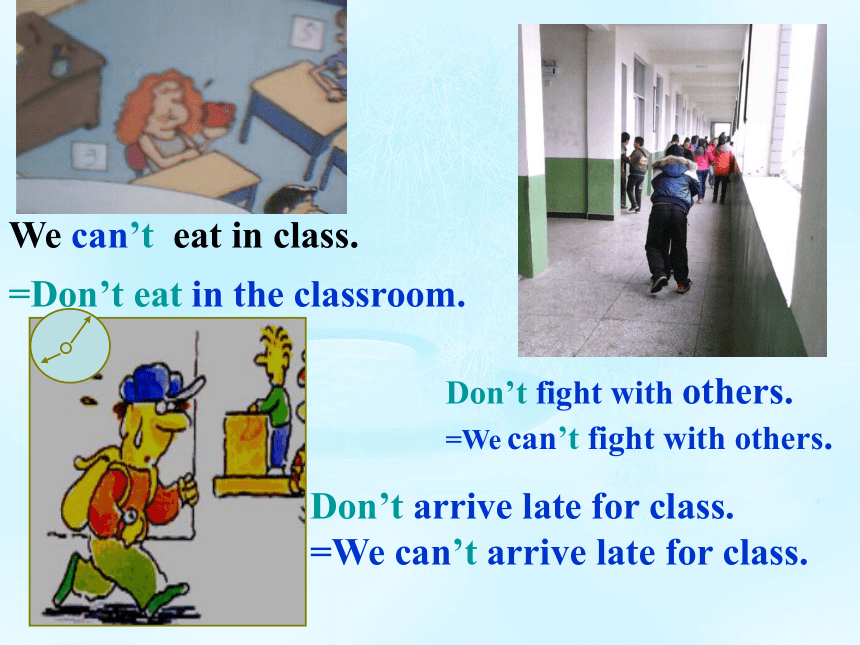
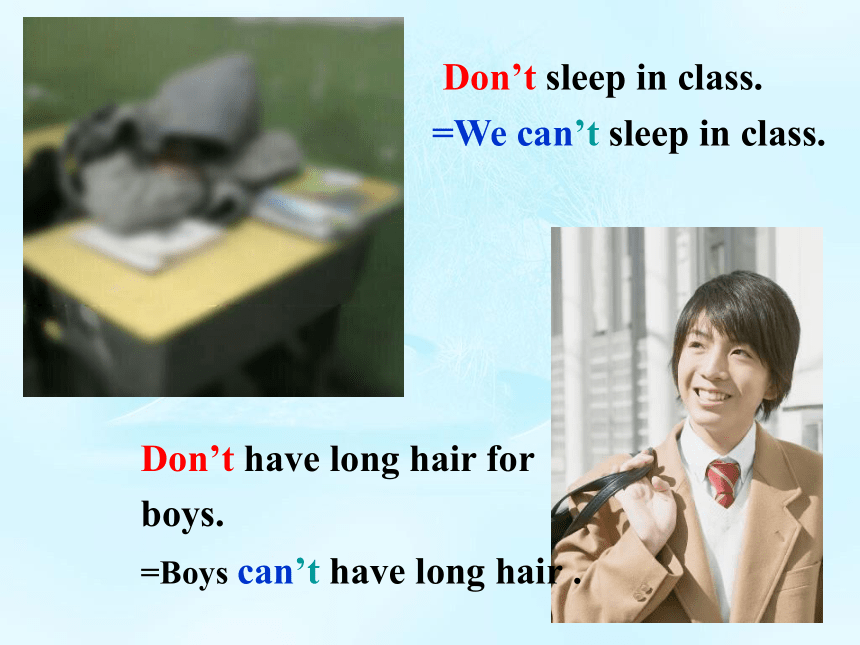
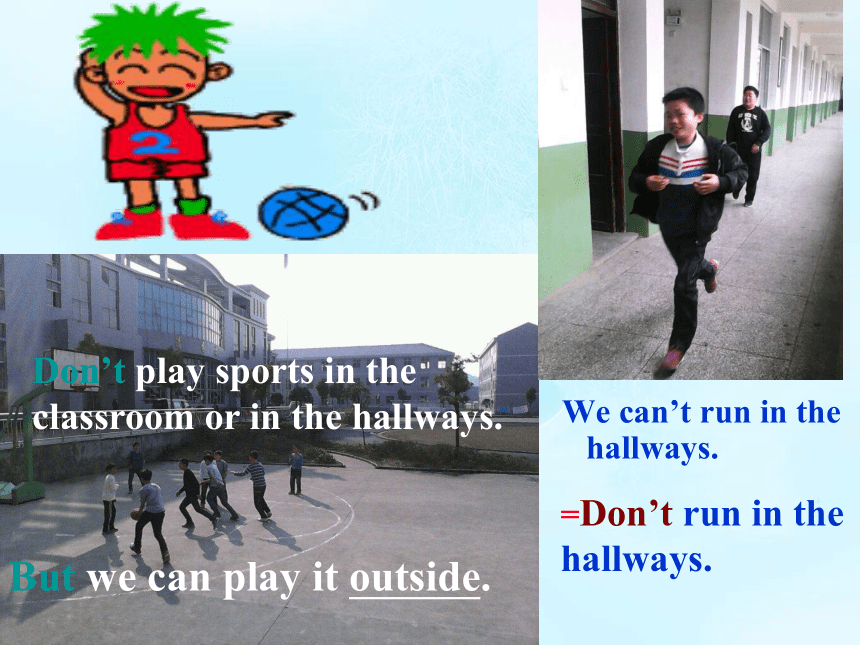
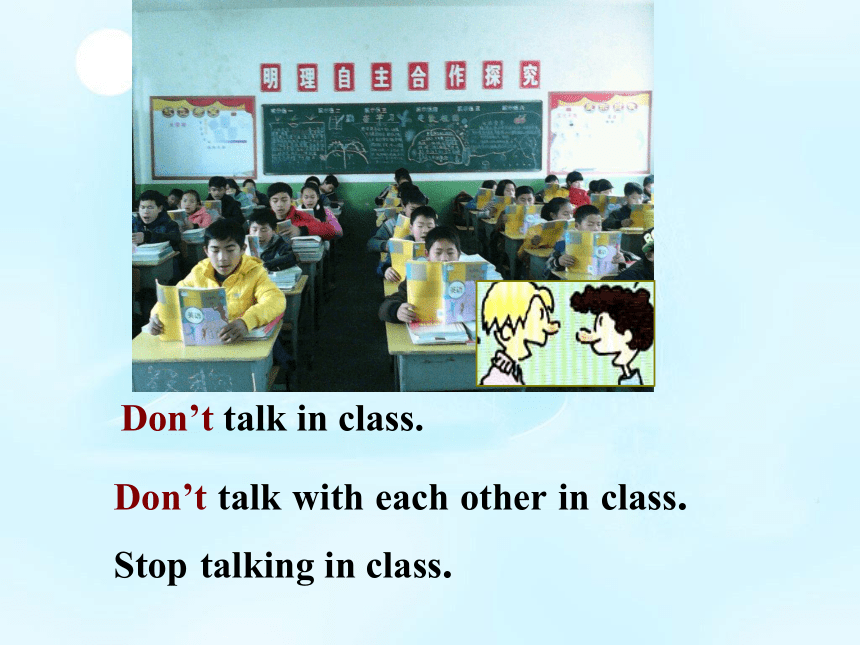
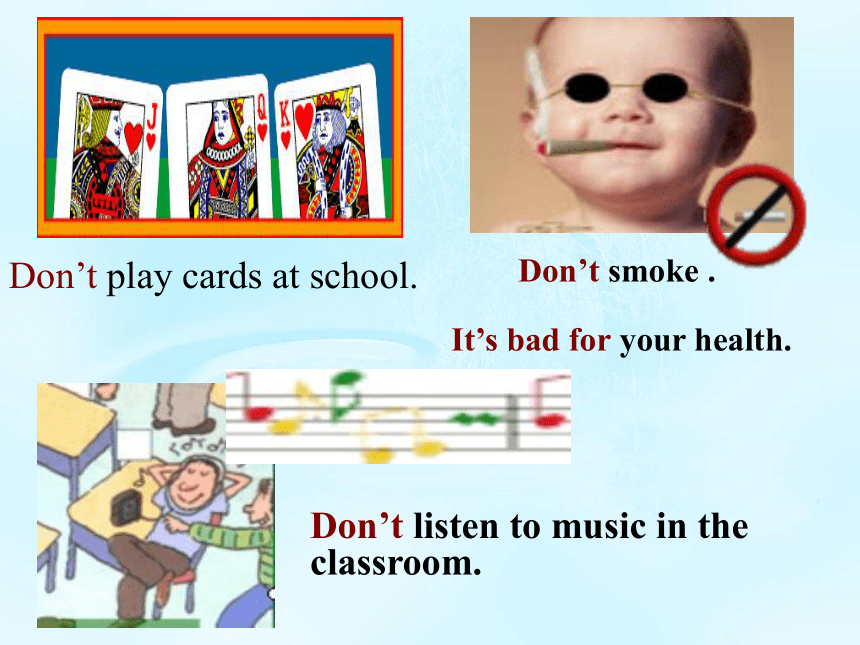
文档简介
(共25张PPT)
Unit
4
Don’t
eat
in
class.
Section
A
grammar
focus—3c
What
do
we
have
to
do
at
school
or
in
the
classroom?
What
can’t
we
do
?
Let’s
look
and
say
some
school
or
class
rulers.
教师寄语:No
rules,
no
standards.
(没有规矩不成方圆。)
We
have
to
do
some
reading
every
morning.
We
have
to
exercise
every
day.
We
have
to
work
hard
and
help
each
other.
We
have
to
clean
our
classroom
and
keep
it
clean
every
day.
.
We
have
to
wear
our
school
ID
card.
We
have
to
do
homework
after
school.
Don’t
fight
with
others.
=We
can’t
fight
with
others.
Don’t
arrive
late
for
class.
=We
can’t
arrive
late
for
class.
We
can’t
eat
in
class.
=Don’t
eat
in
the
classroom.
Don’t
have
long
hair
for
boys.
=Boys
can’t
have
long
hair
.
Don’t
sleep
in
class.
=We
can’t
sleep
in
class.
.
We
can’t
run
in
the
hallways.
=Don’t
run
in
the
hallways.
Don’t
play
sports
in
the
classroom
or
in
the
hallways.
But
we
can
play
it
outside.
Don’t
talk
in
class.
Don’t
talk
with
each
other
in
class.
Stop
talking
in
class.
Don’t
smoke
.
It’s
bad
for
your
health.
Don’t
play
cards
at
school.
Don’t
listen
to
music
in
the
classroom.
Let’s
talk
about
our
family
rules.
Don’t
waste
water.
Turn
off
the
lights
when
we
leave
the
room.
eat
in
bed
watch
TV
late
talk
loudly
on
the
phone
get
up
late
on
Sundays
play
computer
games
late
at
night
sing
loudly
at
night
make
the
bed
after
getting
up
clean
the
bedroom
A:
What
do
you
have
to
do
at
home?
B:
We
have
to…
A:
What
can’t
you
do
?
B:
We
can’t
…
Don’t
run
in
the
hallways.
Don’t
fight.
What
are
the
rules?
We
must
be
on
time
for
class.
Can
we
eat
in
the
classroom?
No,
we
can’t,
but
we
can
eat
in
the
dining
hall.
Can
we
wear
a
hat
in
class?
Yes,
we
can./No,
we
can’t.
Does
he
have
to
wear
a
uniform
at
school?
Yes,
he
does./No,
he
doesn’t.
Grammar
Focus
What
do
you
have
to
do?
We
have
to
be
quiet
in
the
library.
情态动词can的用法
1)
表示能力
“会,
能”
Can?you?play?the?guitar?
你会弹吉他吗?
Jim?can?speak??Chinese.吉姆会说中文。
I?can?dance?and?sing.?
我能唱歌又能跳舞。
2)
表示允许、许可,
“可以”、“能”
Can?the?students?run?in?the?hallway
学生们可以在走廊上跑吗?
We?can?eat?outside.?
我们可以在外面吃东西。
注意:
和大部分情态动词一样,
can在否定句中,
直接在can后加上not,
在疑问句中,
把can放到主语前面,
并且没有人称和数的变化。
have
to的用法
表示客观的必要性:“必须,不得不”,在一定意义上与must可以互换。must没有人称,数和时态的变化。have
to有人称,数和时态变化。
We
have
to
do
homework
after
school.
They
must
be
on
time
for
class.
She
has
to
be
quiet
in
the
library.
Do
you
have
to
go
to
school
on
time?
注意:
have
to在否定句中,
直接在have
to前面加don’t,
在一般疑问句中,
在主语前面加助动词do,
并且有人称,数和时态的变化。
肯定祈使句
Sit
down.
Come
in.
Eat
at
home.
Let’s
go
home.
否定祈使句
Don’t
sit
down.
Don’t
come
in.
Don’t
eat
at
home.
Don’t
talk
in
class.
祈使句用来表示请求、命令、叮嘱、号召或者劝告等,
主语常是第二人称you,也就是听话者,因而you常省去。祈使句的开头是动词原形。句首或句末加上please,若在句末加please,之前要用逗号隔开。
祈使句的否定形式多以do?not
(常缩写成don’t)
开头,
再加上动词原形。
1.
Sit
down.
2.
Come
in.
3.
Eat
at
home.
Don’t
sit
down.
Don’t
come
in.
Don’t
eat
at
home.
把下列祈使句改成否定句
Practice:
4.
Listen
to
music
outside.
5.
Do
your
homework
at
school.
Don’t
listen
to
music
outside.
Don’t
do
your
homework
at
school.
1.
late,
don't,
for
school,
arrive?
2.
music,
listen
to,
in
the
classroom,
don't?
3.
eat,
can't,
in
the
classroom,
we?
Don’t
arrive
late
for
school.
Don’t
listen
to
music
in
the
classroom.
We
can’t
eat
in
the
classroom.
Form
sentences.
组句
Don’t
smoke.
No
smoking!
Don’t
take
photos.
No
photos!
Please
turn
right!
Do
you
know
these?
Don’t
park
here.
No
parking.
Don’t
turn
left.
Don’t
talk
loudly!
Don’t
talk!
No
talking!
Library
rules
1.
Don’t
talk.
2.
__________
3.
__________
________
4.
__________
_______
Don’t
eat.
Write
the
rules
for
the
school
library.
3a
Don’t
listen
to
music.
Don’t
take
photos.
Use
the
words
to
make
questions
about
the
rules.
Then
write
answers
according
to
your
school.
3b
1.
Be
quite?
Q:
Does
she
have
to
be
quite
in
the
library?
(she/have
to/in
the
library)
A:
Yes,
she
does.
2.
Eat?
Q:
________________________________
(he/
have
to/
in
the
dining
hall)?
A:
_________________________________
Does
he
have
to
eat
in
the
dining
hall?
No,
he
doesn’t.
He
can
also
eat
outside.
3.
Listen
to
music?
Q:
________________________________
(we/
can/
in
the
hallways)?
A:
________________
4.
Wear
a
hat?
Q:
_______________________________
(we/
can/
in
the
classroom)?
A:
_______________
Can
we
listen
to
music
in
the
hallways?
Can
we
wear
a
hat
in
the
classroom?
No,
we
can’t.
No,
we
can’t.
3c
Make
up
five
cool
rules
for
your
dream
school.
Share
your
rules
with
the
class.
Your
classmates
vote
for
the
Coolest
School!
At
my
dream
school,
we
don’t
have
to
come
to
school
every
day.
We
…
The
best
school
rules
1.
We
can
eat
in
class.
2.
We
don’t
have
to
come
to
school
every
day.
3.
4.
用所给单词的适当形式填空。
1.
Don’t
________(listen)
to
music
in
the
library.
2.
Do
we
have
to
________(clean)
the
room
every
day?
3.
You
can’t
________(wear)
sunglasses
in
the
classroom.
4.
Please
________(arrive)
at
school
on
time
(准时).
5.
John
is
often
late
for
_______
(class).
class
listen
clean
wear
arrive
将下面的句子改为祈使句,每空一词。
1.
You
can
come
in.
______
____,
please.
2.
I
can
help
you.
_____
me
______
you.
3.
You
can’t
eat
in
class.
_______
_____
in
class.
4.
You
can’t
be
late
for
school.
______
____
late
for
school.
5.
You
can’t
take
photos
here.
____
photos
here.
Come
in
Let
help
Don’t
eat
Don’t
be
No
Summary:
1.情态动词can的用法
2.肯定祈使句和否定祈使句祈使句的常见句型结构
3.通过谈论校规、家规及图书室规则,
进一步掌握祈使句的用法,学会拟定规则,逐渐养成自觉遵
守校纪班规的好习惯。
Unit
4
Don’t
eat
in
class.
Section
A
grammar
focus—3c
What
do
we
have
to
do
at
school
or
in
the
classroom?
What
can’t
we
do
?
Let’s
look
and
say
some
school
or
class
rulers.
教师寄语:No
rules,
no
standards.
(没有规矩不成方圆。)
We
have
to
do
some
reading
every
morning.
We
have
to
exercise
every
day.
We
have
to
work
hard
and
help
each
other.
We
have
to
clean
our
classroom
and
keep
it
clean
every
day.
.
We
have
to
wear
our
school
ID
card.
We
have
to
do
homework
after
school.
Don’t
fight
with
others.
=We
can’t
fight
with
others.
Don’t
arrive
late
for
class.
=We
can’t
arrive
late
for
class.
We
can’t
eat
in
class.
=Don’t
eat
in
the
classroom.
Don’t
have
long
hair
for
boys.
=Boys
can’t
have
long
hair
.
Don’t
sleep
in
class.
=We
can’t
sleep
in
class.
.
We
can’t
run
in
the
hallways.
=Don’t
run
in
the
hallways.
Don’t
play
sports
in
the
classroom
or
in
the
hallways.
But
we
can
play
it
outside.
Don’t
talk
in
class.
Don’t
talk
with
each
other
in
class.
Stop
talking
in
class.
Don’t
smoke
.
It’s
bad
for
your
health.
Don’t
play
cards
at
school.
Don’t
listen
to
music
in
the
classroom.
Let’s
talk
about
our
family
rules.
Don’t
waste
water.
Turn
off
the
lights
when
we
leave
the
room.
eat
in
bed
watch
TV
late
talk
loudly
on
the
phone
get
up
late
on
Sundays
play
computer
games
late
at
night
sing
loudly
at
night
make
the
bed
after
getting
up
clean
the
bedroom
A:
What
do
you
have
to
do
at
home?
B:
We
have
to…
A:
What
can’t
you
do
?
B:
We
can’t
…
Don’t
run
in
the
hallways.
Don’t
fight.
What
are
the
rules?
We
must
be
on
time
for
class.
Can
we
eat
in
the
classroom?
No,
we
can’t,
but
we
can
eat
in
the
dining
hall.
Can
we
wear
a
hat
in
class?
Yes,
we
can./No,
we
can’t.
Does
he
have
to
wear
a
uniform
at
school?
Yes,
he
does./No,
he
doesn’t.
Grammar
Focus
What
do
you
have
to
do?
We
have
to
be
quiet
in
the
library.
情态动词can的用法
1)
表示能力
“会,
能”
Can?you?play?the?guitar?
你会弹吉他吗?
Jim?can?speak??Chinese.吉姆会说中文。
I?can?dance?and?sing.?
我能唱歌又能跳舞。
2)
表示允许、许可,
“可以”、“能”
Can?the?students?run?in?the?hallway
学生们可以在走廊上跑吗?
We?can?eat?outside.?
我们可以在外面吃东西。
注意:
和大部分情态动词一样,
can在否定句中,
直接在can后加上not,
在疑问句中,
把can放到主语前面,
并且没有人称和数的变化。
have
to的用法
表示客观的必要性:“必须,不得不”,在一定意义上与must可以互换。must没有人称,数和时态的变化。have
to有人称,数和时态变化。
We
have
to
do
homework
after
school.
They
must
be
on
time
for
class.
She
has
to
be
quiet
in
the
library.
Do
you
have
to
go
to
school
on
time?
注意:
have
to在否定句中,
直接在have
to前面加don’t,
在一般疑问句中,
在主语前面加助动词do,
并且有人称,数和时态的变化。
肯定祈使句
Sit
down.
Come
in.
Eat
at
home.
Let’s
go
home.
否定祈使句
Don’t
sit
down.
Don’t
come
in.
Don’t
eat
at
home.
Don’t
talk
in
class.
祈使句用来表示请求、命令、叮嘱、号召或者劝告等,
主语常是第二人称you,也就是听话者,因而you常省去。祈使句的开头是动词原形。句首或句末加上please,若在句末加please,之前要用逗号隔开。
祈使句的否定形式多以do?not
(常缩写成don’t)
开头,
再加上动词原形。
1.
Sit
down.
2.
Come
in.
3.
Eat
at
home.
Don’t
sit
down.
Don’t
come
in.
Don’t
eat
at
home.
把下列祈使句改成否定句
Practice:
4.
Listen
to
music
outside.
5.
Do
your
homework
at
school.
Don’t
listen
to
music
outside.
Don’t
do
your
homework
at
school.
1.
late,
don't,
for
school,
arrive?
2.
music,
listen
to,
in
the
classroom,
don't?
3.
eat,
can't,
in
the
classroom,
we?
Don’t
arrive
late
for
school.
Don’t
listen
to
music
in
the
classroom.
We
can’t
eat
in
the
classroom.
Form
sentences.
组句
Don’t
smoke.
No
smoking!
Don’t
take
photos.
No
photos!
Please
turn
right!
Do
you
know
these?
Don’t
park
here.
No
parking.
Don’t
turn
left.
Don’t
talk
loudly!
Don’t
talk!
No
talking!
Library
rules
1.
Don’t
talk.
2.
__________
3.
__________
________
4.
__________
_______
Don’t
eat.
Write
the
rules
for
the
school
library.
3a
Don’t
listen
to
music.
Don’t
take
photos.
Use
the
words
to
make
questions
about
the
rules.
Then
write
answers
according
to
your
school.
3b
1.
Be
quite?
Q:
Does
she
have
to
be
quite
in
the
library?
(she/have
to/in
the
library)
A:
Yes,
she
does.
2.
Eat?
Q:
________________________________
(he/
have
to/
in
the
dining
hall)?
A:
_________________________________
Does
he
have
to
eat
in
the
dining
hall?
No,
he
doesn’t.
He
can
also
eat
outside.
3.
Listen
to
music?
Q:
________________________________
(we/
can/
in
the
hallways)?
A:
________________
4.
Wear
a
hat?
Q:
_______________________________
(we/
can/
in
the
classroom)?
A:
_______________
Can
we
listen
to
music
in
the
hallways?
Can
we
wear
a
hat
in
the
classroom?
No,
we
can’t.
No,
we
can’t.
3c
Make
up
five
cool
rules
for
your
dream
school.
Share
your
rules
with
the
class.
Your
classmates
vote
for
the
Coolest
School!
At
my
dream
school,
we
don’t
have
to
come
to
school
every
day.
We
…
The
best
school
rules
1.
We
can
eat
in
class.
2.
We
don’t
have
to
come
to
school
every
day.
3.
4.
用所给单词的适当形式填空。
1.
Don’t
________(listen)
to
music
in
the
library.
2.
Do
we
have
to
________(clean)
the
room
every
day?
3.
You
can’t
________(wear)
sunglasses
in
the
classroom.
4.
Please
________(arrive)
at
school
on
time
(准时).
5.
John
is
often
late
for
_______
(class).
class
listen
clean
wear
arrive
将下面的句子改为祈使句,每空一词。
1.
You
can
come
in.
______
____,
please.
2.
I
can
help
you.
_____
me
______
you.
3.
You
can’t
eat
in
class.
_______
_____
in
class.
4.
You
can’t
be
late
for
school.
______
____
late
for
school.
5.
You
can’t
take
photos
here.
____
photos
here.
Come
in
Let
help
Don’t
eat
Don’t
be
No
Summary:
1.情态动词can的用法
2.肯定祈使句和否定祈使句祈使句的常见句型结构
3.通过谈论校规、家规及图书室规则,
进一步掌握祈使句的用法,学会拟定规则,逐渐养成自觉遵
守校纪班规的好习惯。
同课章节目录
- Unit 1 Can you play the guitar?
- Section A
- Section B
- Unit 2 What time do you go to school?
- Section A
- Section B
- Unit 3 How do you get to school?
- Section A
- Section B
- Unit 4 Don't eat in class.
- Section A
- Section B
- Unit 5 Why do you like pandas?
- Section A
- Section B
- Unit 6 I'm watching TV.
- Section A
- Section B
- Review of Units 1-6
- Unit 7 It's raining!
- Section A
- Section B
- Unit 8 Is there a post office near here?
- Section A
- Section B
- Unit 9 What does he look like?
- Section A
- Section B
- Unit 10 I'd like some noodles.
- Section A
- Section B
- Unit 11 How was your school trip?
- Section A
- Section B
- Unit 12 What did you do last weekend?
- Section A
- Section B
